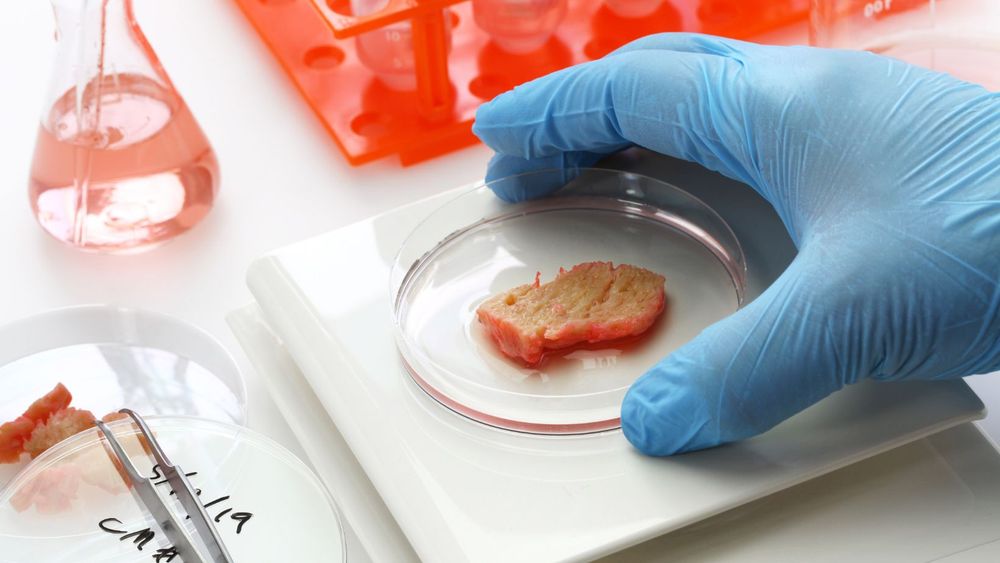What is cultured meat? Is lab-grown meat vegan?
Lab-grown meat, also known as in vitro, artificial, synthetic, or cell-cultured meat, is where animal stem cells are grown in a lab to produce meat. Netflix’s documentary The Future of the Cheeseburger (2022) explains the process: a biopsy from animal muscle, a tissue sample containing stem cells, is placed into a bioreactor machine, which incubates and grows the cells into a meat consistency.
Demand for meat has increased
In 2018 global meat consumption was three hundred million more tonnes compared to fifty million in 1961. And while vegan and plant-based consumption has increased in the last few years, research suggests that many people are cutting down on meat rather than cutting it out entirely.
Vegan economist Romain Espinosa stresses that animal farms optimise “the risk of epidemic viruses, foodborne illness, and antibiotic resistance… deeply threatening food security and public health.” Research in the Netherlands found that about half of all chicken meat contained faecal bacteria.
Cultured meat companies funding research, such as New Harvest, believe it is healthier, as it can be engineered to contain more protein and less harmful fats and reduce the likelihood of being contaminated with harmful bacteria such as E. coli. If globally successful, it could dramatically decrease harm associated with abattoirs: such as mental and physical harm slaughterhouse workers experience and the unnecessary rearing and killing of livestock. It could also help tackle food shortages.
In 2012, the first-ever lab-grown hamburger cost $325,000. Since then, the prices have dropped dramatically, with a 5-ounce burger estimated at costing around $11. Scaling up will continue bringing costs down, making it more affordable, but is it sustainable and ethical?
Is lab-grown meat vegan?
Lab-grown meat is not vegan - it currently requires invasively extracting stem cells from alive subjects. Currently, as Professor Mark Post from Mosa Meat explains, the production requires keeping a limited number of animals and involves slaughter. However, proponents of lab-grown meat argue that it would cut the slaughtering and suffering of millions of animals.
Even as science proves animal sentience and the health benefits of plant-based diets, meat agriculture will not shut down automatically. A vegan utopia would be living without exploiting any living beings; however, realistically, replacing the current animal farming model with lab-grown meat may be a step towards reducing mass animal cruelty, even if we as vegans, disagree with the ethics behind it, as the animals reared for the process will not be free from harm.
Ginger Hultin, who specialises in integrative health and oncology, nutrigenomics, and plant-based diets, suggests that in the future, growing meat via cells extracted from animals “could be replaced with plant sources, such as mushrooms or other cultured products.”
Early days: Is it viable?
It is unclear how much environmental impact cultured meat will cause, as bioreactors need energy; however, New Harvest predicts that by 2040, sixty percent of ‘meat’ will be plant-based or grown, with shops and restaurants growing meat on-premises - cutting down on resources for exportation, animal feed, rearing and factories. According to Humane Society International, animal agriculture currently contributes to approximately twenty percent of global greenhouse gas emissions and environmental degradation, from biodiversity loss to deforestation.
Touching on various markets, including sustainability, animal and public health benefits, lab-grown investment is predicted to reach a ninety five percent Compound Annual Growth Rate (CAGR) from 2022 to 2030, with current investors such as Bill Gates and Sir Richard Branson.
In 2020, Singapore was the world’s first to give regulatory approval to “clean meat”, allowing San Francisco-based startup Eat Just to sell lab-grown chicken meat under the brand GOOD Meat.
However, some scientists are sceptical: Michael Hansen, PhD, senior staff scientist with Consumer Reports, claims in Climate Depot (June 28th 2022) that scientific papers have not analysed the nutritional characteristics of the finished product, and academics have not received samples, implying “problems behind the scenes,” says Hansen. With any industry that stands to generate a lot of stakeholder wealth, it is essential to be sceptical and demand transparency.
It still feels like early days for cultured meat. Perhaps in the future, those adamant meat-eaters will consider being, as The Guardian puts it, ‘cytovores’, consumers of cells rather than of ‘kill-meat’, or even better, consumers of plant cells and leaving animals off the menu for good.
